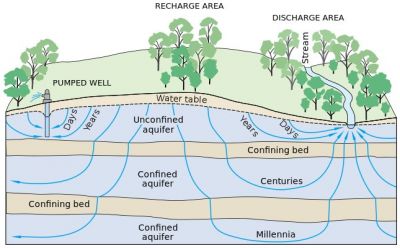Dilution and mixing in groundwater

Groundwater_flow, fot. public domain
Protection and sustainable use of water supply is one of the most important environmental issues facing humanity. Groundwater is the primary source of drinking water for much of the world, as well as being vital for agriculture and industry, but it is under threat from pollution.
Understanding how contaminants are transported is crucial for the
protection and management of groundwater and the implementation of
technologies for its remediation. Dilution and mixing processes play a
key role for the transport of solutes in porous aquifer systems.
These processes are typically slow and often represent the limiting factor for the breakdown of contaminants in groundwater systems. Therefore, an understanding and accurate description of dilution and mixing is necessary for the application of remedial actions and the implementation of successful groundwater management strategies.
The EU-funded project 'Compound-dependent dilution and reactive processes in groundwater' (DILREACT) combined high-resolution laboratory and field data with multi-scale numerical modelling. Its aim was to improve understanding of processes such as incomplete mixing and the development of compound-specific concentration gradients in pore channels.
Results were used for further theoretical and applied research as well as practical applications. They included the management of groundwater resources, risk assessment, and the implementation of both natural and engineered remediation of contaminated sites. These applications will help protect groundwater as a reservoir for drinking water and as a valuable environmental resource.
DILREACT results will also benefit environmental policymakers and public and private consultants dealing with water quality issues and the management and remediation of contaminated sites. In addition, the project's findings are relevant to a wide range of disciplines dealing with flow and transport in porous media. They include reservoir engineering, carbon sequestration, chemical engineering, geology and geochemistry.
published: 2015-07-27